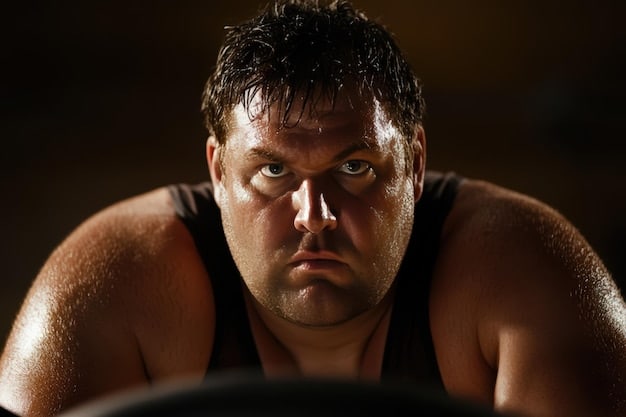Master Peak Performance: Winning Mindset for Athletes

Developing a winning mindset involves cultivating resilience, self-belief, and effective mental strategies to overcome challenges, optimize training, and achieve peak performance in competitive sports environments through sustained practice and dedicated mental conditioning.
In the demanding world of sports, physical prowess alone is rarely enough to guarantee success. What truly sets elite athletes apart is their ability to develop a winning mindset and overcome mental barriers to achieve peak performance. This journey transcends physical training, delving deep into the psychological landscape where resilience, focus, and unwavering self-belief are forged.
The Foundation of a Winning Mindset: Beyond Physicality
A winning mindset in athletics is not merely about positive thinking; it embodies a holistic psychological approach that primes an individual for consistent high-level performance. It involves understanding and harnessing the intricate connection between the mind and body, recognizing that mental strength can often be the decisive factor when physical capabilities are evenly matched.
This journey begins with a foundational understanding of what constitutes genuine mental fortitude in the context of competitive sports. It’s about more than just wanting to win; it’s about building the internal architecture that supports victory, even in the face of immense pressure and adversity. Many athletes discover that their greatest competitors are often their own doubts and fears.
Defining Mental Toughness in Sports
Mental toughness, a cornerstone of the winning mindset, encompasses several key attributes that enable athletes to perform consistently at their best, regardless of circumstances. It is the ingrained ability to manage stress, stay focused, and maintain confidence under pressure.
- Resilience: The capacity to bounce back quickly from setbacks, injuries, or losses.
- Focus: Maintaining attention on relevant cues while blocking out distractions, both internal and external.
- Confidence: An unshakeable belief in one’s abilities, despite past failures or current challenges.
- Control: The ability to regulate emotions and thoughts, especially in high-stakes situations.
These elements are interdependent and collectively contribute to an athlete’s mental toughness, allowing them to navigate the unpredictable landscape of competition with greater stability and effectiveness. It is a continuous process of refinement, much like honing a physical skill.
Developing this foundation requires disciplined effort and a willingness to confront one’s own mental limitations. It is about actively cultivating habits that reinforce positive thought patterns and performance-enhancing behaviors, moving beyond wishful thinking to concrete, actionable strategies.
Ultimately, a winning mindset is about creating a mental environment that is conducive to achieving one’s highest potential, transforming pressure into privilege and challenges into opportunities for growth. It is the invisible advantage that often separates champions from contenders.
Cultivating Self-Belief and Confidence: The Inner Anchor
Self-belief and confidence are not innate; they are cultivated through a combination of preparation, experience, and deliberate mental practices. For athletes, this internal anchor is crucial, providing stability when the external environment is tumultuous and self-doubt begins to creep in. It’s the conviction that you are capable of performing the task at hand, even under the most intense scrutiny.
True confidence stems from a realistic assessment of one’s abilities coupled with a commitment to continuous improvement. It’s not about ego, but about a deep, quiet certainty that comes from dedicated work and successful execution, no matter the scale.
Strategies for Building Unwavering Confidence
Athletes can employ several concrete strategies to bolster their self-belief, transforming hesitant apprehension into assertive readiness. These strategies focus on reshaping perceptions and reinforcing positive self-talk.
- Positive Self-Talk: Replacing negative or doubtful thoughts with constructive and affirming statements. This internal dialogue can significantly impact performance outcomes.
- Visualization and Imagery: Mentally rehearsing successful performances, vividly imagining triumph over obstacles. This prepares the brain and body for actual competition.
- Goal Setting: Establishing clear, challenging, yet attainable goals provides a roadmap for progress and builds confidence with each milestone achieved.
- Past Success Recall: Regularly reflecting on previous accomplishments, however small, reinforces an athlete’s capability and reminds them of their inherent strengths.
Beyond these techniques, understanding the concept of “unconditional self-acceptance” can free athletes from the tyranny of performance-based self-worth. This means valuing oneself regardless of results, which ironically can lead to better performance by reducing performance anxiety.
Coaches and support staff also play a vital role in fostering an environment where athletes feel safe to take risks and learn from mistakes without fear of judgment. This supportive ecosystem is just as important as individual mental training routines.
By consistently applying these techniques, athletes can build a robust internal framework of self-belief that acts as an impenetrable shield against the mental assaults of competition, enabling them to step onto any stage with unwavering confidence.
Mastering Emotional Regulation and Stress Management
The high-stakes environment of competitive sports inevitably brings intense pressure and a cascade of emotions. Mastering emotional regulation and stress management is not about eliminating these feelings but about learning to acknowledge, interpret, and channel them productively. An athlete who can remain composed under duress gains a significant edge.
Understanding the physiological and psychological responses to stress is the first step. Stress isn’t inherently bad; it’s how an athlete perceives and responds to it that determines its impact on performance.
Techniques for Maintaining Composure Under Pressure
Effective emotional regulation involves specific techniques that athletes can practice and deploy in real-time, helping them navigate the emotional rollercoaster of competition without derailing their performance.
- Mindfulness and Meditation: Cultivating present-moment awareness can reduce overthinking and emotional reactivity, allowing athletes to focus on the task at hand rather than anxieties.
- Deep Breathing Exercises: Simple yet powerful, controlled breathing can calm the nervous system, reduce heart rate, and restore mental clarity during stressful moments.
- Reframing Negative Thoughts: Transforming performance anxiety or fear into excitement and competitive drive. For instance, interpreting a pounding heart as readiness rather than panic.
- Pre-Performance Routines: Establishing consistent rituals before competition can create a sense of control and familiarity, reducing pre-event jitters and focusing the mind.

Furthermore, recognizing the difference between challenge stress (eustress) and threat stress (distress) can empower athletes to approach difficult situations with a growth mindset. When challenges are seen as opportunities for development, stress becomes a motivator rather than a paralyzing force.
It’s also crucial for athletes to develop healthy outlets for stress outside of their sport, whether through hobbies, social connections, or sufficient rest. A balanced life contributes significantly to mental well-being and resilience on the field.
By diligently practicing these techniques, athletes can transform their emotional responses from potential liabilities into powerful assets, ensuring they remain in control and perform optimally when it matters most.
Harnessing Focus and Attention Control
In the whirlwind of competition, an athlete’s ability to selectively focus on relevant information and block out distractions is paramount. This skill, known as attention control, separates those who consistently perform under pressure from those who crumble. Distractions, whether internal (self-doubt, fatigue) or external (crowd noise, opponent’s tactics), can drastically impair performance.
Developing robust focus mechanisms allows athletes to maintain concentration on critical aspects of their performance, from executing a specific skill to strategizing against an opponent. It’s about being fully present in the moment.
Strategies for Enhanced Focus and Concentration
Athletes can employ targeted strategies to refine their ability to focus, ensuring their mental energy is directed efficiently and effectively during training and competition.
- Simulation Training: Practicing in environments that replicate the noise, pressure, and specific challenges of actual competition helps athletes habituate to potential distractions.
- Cue Utilization: Identifying and focusing on specific, actionable cues (e.g., watching the ball, feeling the weight distribution) that are directly relevant to performance, rather than general outcomes.
- Mindfulness Breaks: Short, deliberate pauses during training or competition to recenter attention and bring awareness back to the present moment, especially after errors or distractions.
- Pre-Shot/Pre-Performance Routines: A specific sequence of actions or thoughts executed before a skill, designed to bring optimal focus and block out extraneous information.
The concept of “flow state,” where an athlete is completely immersed and focused on the activity, represents the pinnacle of attention control. While not always achievable on demand, optimizing conditions for flow can significantly enhance performance and enjoyment.
Coaches play a critical role in structuring training sessions that demand and develop focused attention, gradually introducing complexity and potential distractions to build up an athlete’s tolerance and skill in maintaining concentration.
Ultimately, a highly developed capacity for focus and attention control allows athletes to perform with precision and efficiency, cutting through the noise to execute their game plan effectively and adapt swiftly to changing circumstances.
Building Resilience and Overcoming Adversity
Adversity is an inevitable component of an athlete’s journey, manifesting as injuries, losses, performance slumps, or personal challenges. The capacity to build resilience – the ability to adapt positively in the face of significant stress or trauma – is a hallmark of a winning mindset. It’s not about avoiding hardship, but about developing the fortitude to bounce back stronger.
Understanding resilience as a dynamic process, rather than a fixed trait, empowers athletes to actively cultivate strategies that enhance their ability to cope with setbacks and emerge with renewed determination.
Actions to Enhance Athletic Resilience
Cultivating resilience involves a combination of mental approaches and practical support systems that enable athletes to navigate through difficult periods without losing sight of their goals.
- Learning from Failure: Viewing losses or mistakes not as endpoints but as valuable learning opportunities for growth and improvement. Analyze, adjust, and move forward.
- Seeking Social Support: Leaning on teammates, coaches, family, and friends for emotional support and perspective during challenging times. Isolation can amplify difficulties.
- Developing Coping Mechanisms: Identifying healthy ways to deal with stress and disappointment, such as journaling, talking through emotions, or engaging in relaxing activities.
- Maintaining Perspective: Recognizing that a single performance or outcome does not define one’s entire worth or career. The long-term journey is more important than isolated events.

Moreover, developing a strong sense of purpose beyond just winning can fortify an athlete’s resilience. When an athlete connects their sport to deeper values or contributions, the intrinsic motivation helps them persevere through periods of doubt or lack of immediate success.
Rehabilitation from injury, for example, is as much a mental challenge as a physical one. Athletes who approach recovery with patience, discipline, and a positive outlook often return stronger, both physically and mentally, than those who succumb to frustration.
By embracing these tenets of resilience, athletes can transform adversity into a catalyst for personal and athletic growth, reinforcing their winning mindset and propelling them towards sustained peak performance.
The Role of Coaching and Environment in Mindset Development
While individual effort is critical, the ecosystem an athlete operates within—defined by their coaches, teammates, and overall training environment—profoundly influences their ability to develop and sustain a winning mindset. Coaches, in particular, serve as architects of this psychological landscape.
An effective coaching philosophy extends beyond technical instruction to encompass mentorship, psychological support, and the creation of a culture that champions mental fortitude and resilience. The environment should foster growth, accountability, and psychological safety.
Creating a Supportive and Challenging Environment
Coaches and sports organizations have a responsibility to design environments that inherently support the development of a winning mindset, ensuring athletes are not only physically prepared but also mentally robust.
- Emphasizing Growth Mindset: Promoting the belief that abilities can be developed through dedication and hard work, rather than being fixed. This encourages continuous learning and adaptation.
- Constructive Feedback: Delivering feedback that is specific, actionable, and focuses on effort and process rather than solely on outcomes. This builds confidence and clarifies paths to improvement.
- Team Cohesion: Fostering a strong sense of camaraderie and mutual support among teammates, creating a network where athletes feel understood and valued.
- Psychological Skills Training: Integrating mental skills coaching (e.g., goal setting, visualization, mindfulness) directly into regular training schedules, normalizing mental conditioning.
Building trust between athletes and coaches is paramount. When athletes feel trusted and supported, they are more likely to take risks, admit vulnerabilities, and fully embrace challenging mental training exercises. This trust forms the bedrock of a productive coach-athlete relationship.
Furthermore, an optimal environment provides opportunities for both success and respectful failure, allowing athletes to test their limits and learn from setbacks without severe repercussions. It’s about calibrating challenge to an athlete’s current development stage.
Ultimately, a supportive and challenging environment, spearheaded by insightful coaching, provides the fertile ground necessary for athletes to cultivate and continuously sharpen the mental tools required for elite performance.
Sustaining Peak Performance Through Ongoing Mental Conditioning
Achieving peak performance is not a singular event but a continuous process that requires ongoing mental conditioning. Just as physical training is cyclical and progressive, so too must be the development of a winning mindset. complacency is the enemy of sustained excellence.
Elite athletes understand that the mental game is never “mastered” but constantly refined. As competitive levels rise and personal challenges evolve, so too must the strategies for mental strength and resilience. This commitment to perpetual self-improvement is what differentiates good from great.
Long-Term Strategies for Mental Edge
To sustain peak performance over an extended career, athletes must integrate mental conditioning as a non-negotiable part of their daily routine, viewing it with the same importance as physical practice.
- Regular Mental Skill Drills: Incorporating brief, targeted exercises for focus, visualization, or emotional regulation into daily training, making them second nature.
- Performance Review with Mental Lens: Post-competition analysis should include a thorough review of mental performance: “How did I manage pressure? What were my thoughts like before X moment?”
- Seeking Professional Guidance: Working with a sports psychologist or mental performance coach for personalized strategies, addressing specific barriers, and refining existing skills.
- Holistic Well-being: Prioritizing sleep, nutrition, recovery, and maintaining a healthy work-life balance. Mental fatigue often stems from overall physical and emotional depletion.
Adapting mental strategies to different phases of the season (e.g., off-season, pre-season, in-season) is also crucial. The mental demands of a training block differ significantly from the intense pressures of championship events.
Moreover, developing self-awareness is key. Athletes who understand their own mental patterns, triggers, and signs of fatigue are better equipped to implement timely interventions and maintain optimal psychological states.
By weaving these long-term mental conditioning strategies into the fabric of their athletic life, individuals can not only reach peak performance but sustain it, building a legacy defined by both physical prowess and unwavering mental fortitude.
| Key Aspect | Brief Description |
|---|---|
| 🧠 Mental Toughness | Resilience, focus, confidence, and control under pressure define athletic mental strength. |
| 💪 Self-Belief | Cultivated through positive self-talk, visualization, and consistent goal achievement. |
| 🧘♀️ Emotional Control | Mastering emotions via mindfulness, breathing, and reframing negative thoughts. |
| 📈 Sustained Performance | Requires ongoing mental conditioning, professional guidance, and holistic well-being. |
Frequently Asked Questions About Athlete Mindset
A “winning mindset” in sports refers to a comprehensive psychological approach where athletes foster resilience, unwavering self-belief, and sharp focus. It enables them to effectively manage pressure, overcome mental obstacles, and consistently deliver peak performance, becoming the invisible edge that separates champions.
Athletes build self-belief through consistent positive self-talk, mental visualization of successful performances, and setting clear, achievable goals. Regularly reflecting on past successes also reinforces their capabilities, creating a strong internal foundation of confidence and competence.
Coaches are crucial in mindset development by fostering a growth mindset, providing constructive feedback, and building strong team cohesion. They also integrate psychological skills training into routines, creating a supportive yet challenging environment where athletes feel safe to grow and adapt.
Athletes overcome mental barriers by employing techniques such as mindfulness, deep breathing exercises, and reframing negative thoughts into positive competitive energy. Developing consistent pre-performance routines and seeking professional psychological guidance also provides effective strategies for managing anxiety and doubt.
Mental conditioning is an ongoing and continuous process, not a one-time effort. Elite athletes integrate regular mental skill drills, conduct psychological performance reviews, and prioritize holistic well-being to continuously refine their mindset. This ensures sustained peak performance and adaptability throughout their athletic careers.
Conclusion
The journey to peak athletic performance is undeniably multifaceted, encompassing rigorous physical training, strategic tactical preparation, and equally important, profound mental conditioning. Developing a winning mindset and overcoming mental barriers is not a passive endeavor but an active, continuous commitment. By cultivating self-belief, mastering emotional regulation, honing focus, building resilience, and operating within a supportive environment, athletes can unlock their fullest potential. This integrated approach to development ensures that the mind is as finely tuned as the body, ready to navigate the inevitable challenges and seize opportunities for success. The ultimate triumph in sports often belongs to those who win the battle within themselves, demonstrating that true athletic mastery is as much a psychological art as it is a physical science.





